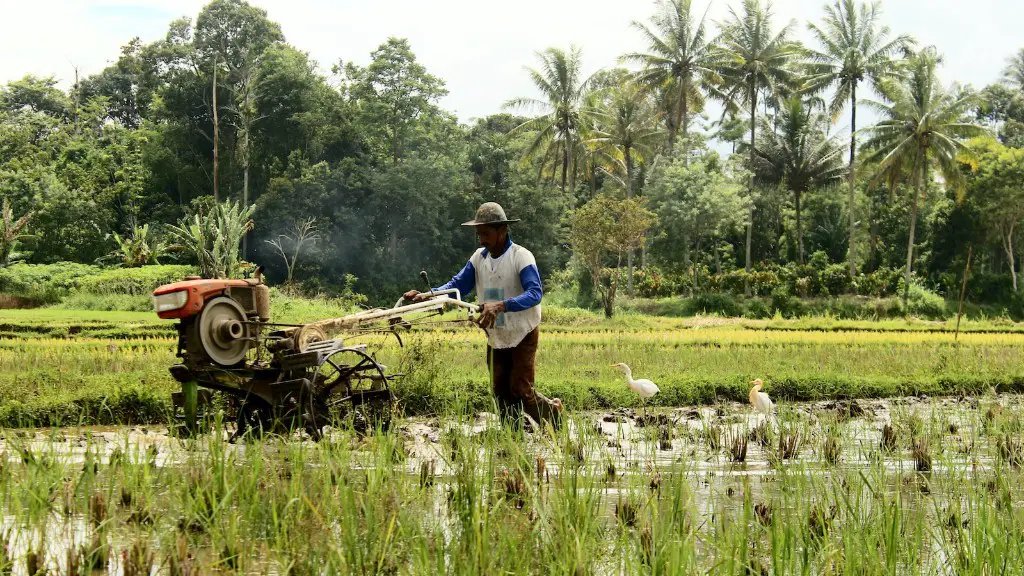Agriculture is one of the most important industries in the world. It provides employment to millions of people, not only directly in farming but also in the many industries and services related to it. The opportunities for employment in agriculture include farm services, supply and production, marketing, retail, education, and research.
Agriculture can create job opportunities on the farm level by making use of available resources. Many farmers engage contract staff to help them with tasks such as tillage, planting and harvesting. Farmers may also hire staff for managerial, administrative and technical roles.
In addition to farm-level employment, jobs in the supply and production chain are abundant. These positions range from production assistants, warehouse operators, and distribution personnel. Other jobs such as sales agents, agricultural market research technicians, and agronomists are also available.
Marketing is yet another area that provides employment in agriculture. That involves the promotion and sale of agricultural products. Marketing staff are responsible for defining and promoting products and establishing sales channels.
Retail is another key employment sector for agricultural businesses. Retail outlet personnel perform tasks such as stocking shelves, taking orders, and providing customer service. Retailers may also employ specialists in other roles such as merchandising, marketing, and business development.
Agriculture also provides educational opportunities. An increasing number of universities, colleges and technical schools offer degree and certificate programs in agriculture, agri-business and related fields.
Last but not least, research opportunities in agriculture are available. Researchers may work either in the laboratory or in the field. Roles include plant and animal scientists, soil experts and environmental engineers.
Farm Services
Agriculture provides employment opportunities on the farm level in various farm services. These include land preparation, seeding and harvesting activities. Additionally, agricultural machinery operators, agronomists and veterinary service technicians are in demand. Contract farming is becoming increasingly popular and is a great way for producers to supplement their income as well as to increase their production.
Herders and ranchers are also employed in agriculture. They manage livestock, including keeping them healthy and well-fed. This can involve the use of expertise in nutrition, animal health, and ranch maintenance.
Farmers may also hire crew for tasks such as preparing and producing forage crop, using the appropriate machinery and gathering and storing the harvest. Workers may also be needed in fruit and vegetable production, as well as for other specific crop production tasks.
Agriculture also provides employment opportunities in the management of irrigation systems, soil and water conservation, and pest and weed control. These jobs may involve the use of specialized knowledge of agricultural systems and practices, such as developing and implementing strategies to protect crops.
Agriculture also provides employment opportunities in the marketing of produce. These include roles such as field agents and marketing staff. They are responsible for delivering information to local supermarkets and other food outlets. Additionally, they may also set up stands at farmers’ markets and in other public areas for retail purposes.
Farmers may also hire staff to assist in the promotion of the farm’s produce and other related activities, such as advertising and product promotion. Farmers may also hire transport personnel who are responsible for loading and delivering products, as well as managing the inventory of the farm.
Supply and Production Chain
Agriculture also provides employment opportunities in the supply and production chain. This includes roles such as production assistants and warehouse operators. These positions involve the overseeing of the production and distribution of agricultural products. Production assistants can also be responsible for the inventory and maintenance of the farm’s production equipment.
Agricultural market research technicians are needed to carry out market research and analysis, identifying the best outlets and sales strategies. They must be able to interpret market data, develop business plans and monitor the progress of the farm’s operations.
Agronomists are also employed in agriculture. They may work as part of a research team or as a consultant for cropping and livestock production related matters. They may also be involved in the development and implementation of management practices.
Warehousing workers are also employed in agriculture. They are responsible for loading and unloading of trucks, as well as for the maintenance and security of the warehouse. Other warehouse jobs include receiving and shipping personnel, letting staff members, forklift operators and inventory control.
Agriculture is also an important part of the distribution chain. Distribution personnel are employed to ensure that agricultural products are delivered to their desired locations. They are also responsible for ensuring that the products meet required quality standards.
Marketing
Agriculture provides employment opportunities in the field of marketing. These jobs involve the promotion and sale of agricultural products. Marketing staff may be responsible for designing and promoting products, arranging sales channels, and advertising the products.
Marketers must also be knowledgeable about market trends and customer needs in order to develop and implement effective sales strategies. Additionally, marketers must be aware of relevant legal regulations, such as food safety and labeling laws.
Marketers may also be responsible for preparing promotional materials, such as advertising materials, brochures, and website content. They may also help to develop relationships with customers, establish contacts with potential customers, and coordinate the activities of sales personnel.
In addition to marketing staff, agriculture also employs merchandisers. They are responsible for understanding customer requirements, recommending products, and providing customer service. They may also oversee the purchasing, warehousing and distribution of products.
Business development specialists are also needed in the agricultural industry. They are responsible for developing strategies that ensure the business is viable and competitive. These strategies include product development, creating and managing partnerships, and improving customer service.
Retail
Agriculture also provides employment opportunities in retail. Retail sales personnel are responsible for stocking shelves, taking orders, and providing customer service. The retail outlets may focus on organic and natural foods, processed foods, beverages, or specialty products. Other retail server roles may include cashiers, customer service reps, and distribution personnel.
Retail specialists may also be employed in roles such as retail merchandisers and marketing analysts. They are responsible for developing and implementing strategies that promote the sale of agricultural products. They must also be familiar with customer requirements, develop customer relationships, and be able to negotiate prices.
Retail store staff may also be employed to assist with the operation of the outlet. These roles may include managing inventory, customer service, and assistance in the operation of the store. Retail staff may also be responsible for maintaining safety standards, product quality control, and managing waste.
Business analysts may also be employed in the retail sector. They analyze and report on customer trends, identify opportunities, and develop new products or services. They must also be familiar with the latest market developments, industry trends, and business processes.
Retailers may also hire staff for managerial secondments. These may include store managers, area sales managers, and marketing coordinators. These professionals must have a deep understanding of the retail environment, and be able to manage the store effectively and efficiently.
Education and Research
Agriculture also provides employment opportunities in the field of education. Universities, colleges and technical schools offer degree and certificate programs in agriculture, agri-business and related fields. They also recruit faculty members and industry experts to teach these programs.
Agriculture also provides employment in research. Roles include plant and animal scientists, soil experts and environmental engineers. Researchers may also be responsible for the development and improvement of agricultural practices and products.
Researchers may also develop and implement strategies for the management of resources, such as water, soil and land. They may also be involved in the assessment and analysis of agricultural systems, including the monitoring of crop yields.
Finally, research staff may also be employed in the field of food processing. This includes roles such as food technologists, plant and quality assurance technicians, and food production supervisors. They must be able to assess food safety and quality, as well as develop new products and technologies.
Agriculture provides numerous employment opportunities for professionals in a wide range of fields, from farm services and the supply and production chain to marketing, retail, education and research. With the right qualifications and commitment, anyone can find employment in the agricultural industry.





